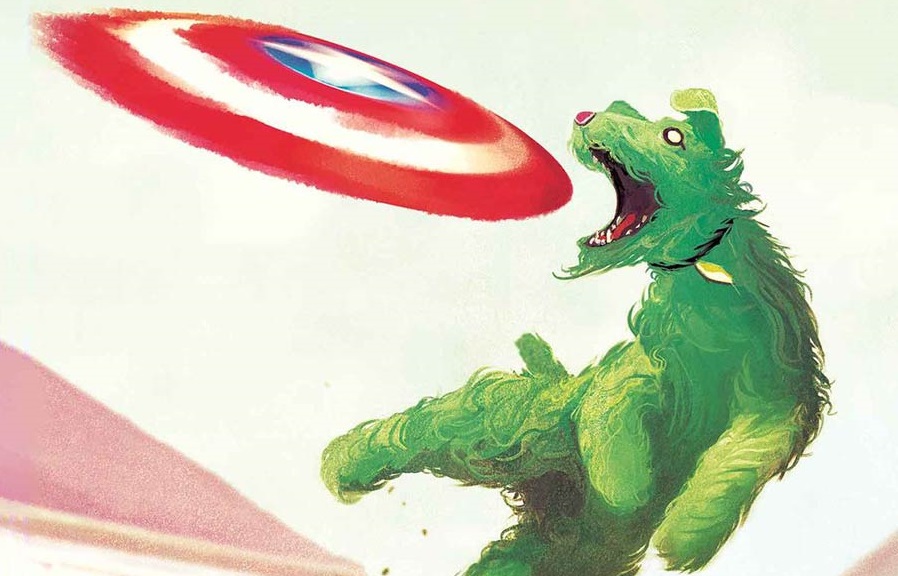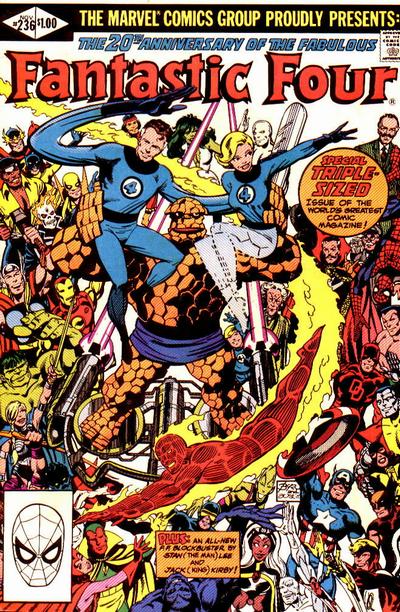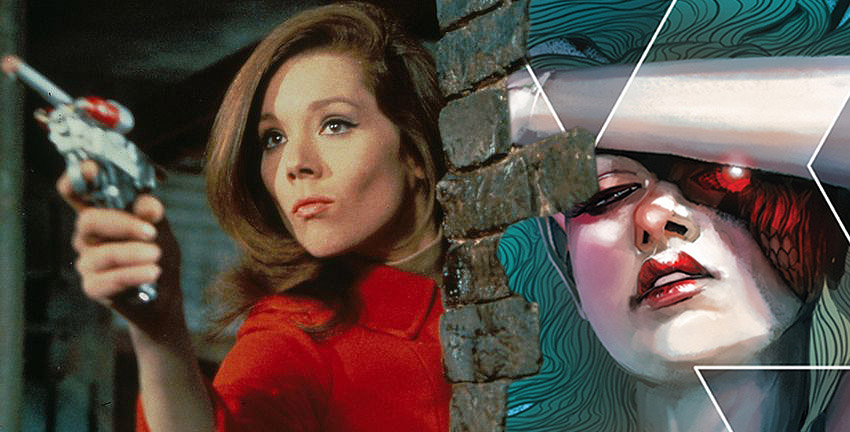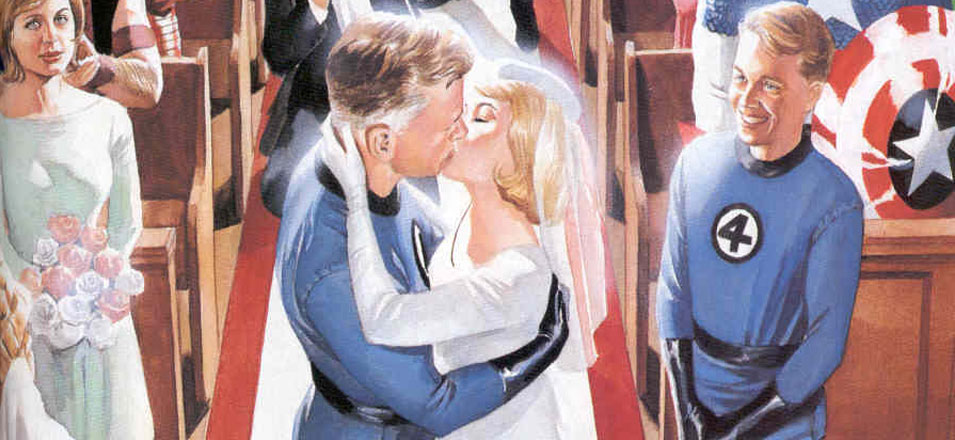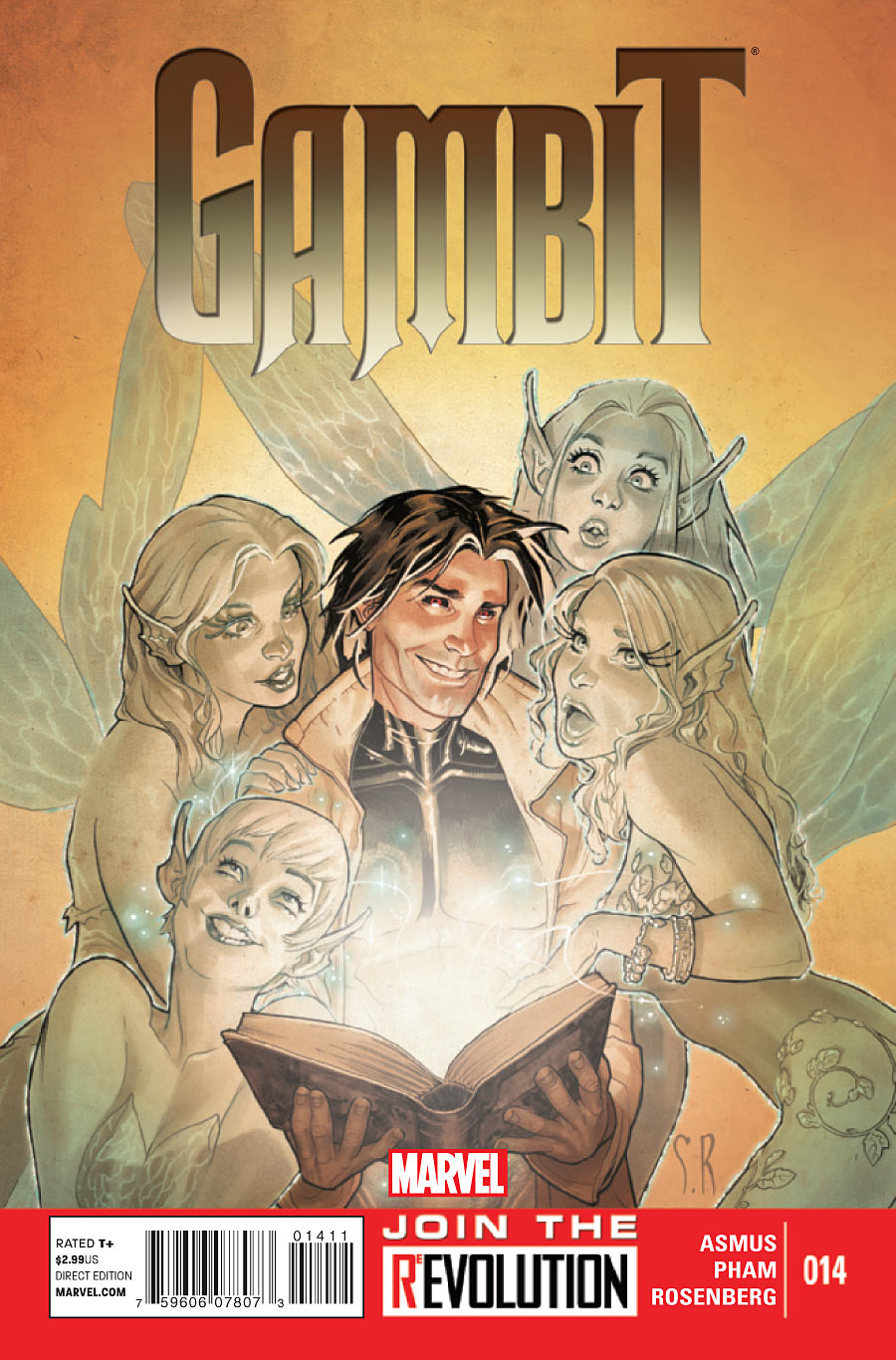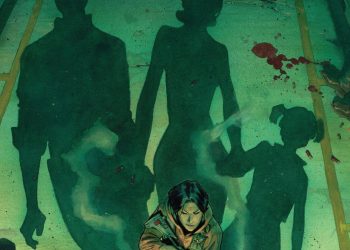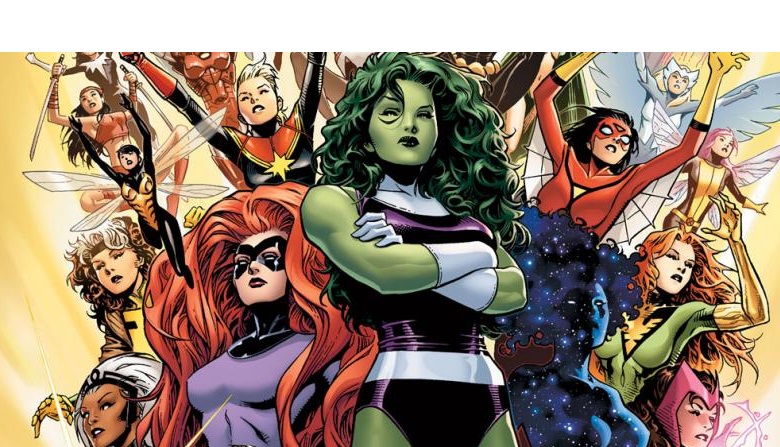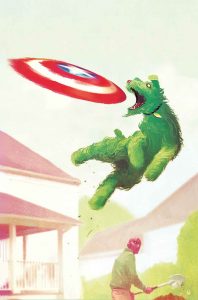
The Vision #11: You And I Were Born For Better Things
Writer: Tom King
Artist: Gabriel Hernandez Walta
Color Artist: Jordie Bellaire
Letterer: VC’s Clayton Cowles
Review By: Nate Mondschein (@33andMoonshine)
–Look, Tom King is a much better writer than I am, so even if you’re not nervous about SPOILERS, you should really read The Vision #1-11 before you spend any time reading this–
“Many years later, as he faced the firing squad, Colonel Aureliano Buendia was to remember that distant afternoon when is father took him to discover ice.”
-Gabriel Garcia Marquez, 100 Years of Solitude (Translation by Gregory Rabassa)
And suddenly, there it is. No warning to proceed it, no carful trajectory and build; just an apparent conclusion handed to us long before its time. In a story as inextricably intertwined with destiny and fate as 100 Years of Solitude, it seems all too fitting that Marquez use the opening line of his epic to force his readers to contend with the same inevitable gravity of “what will be” as his characters.
I have gathered no evidence to suggest whether or not Tom King has ever read 100 Years of Solitude, because unlike him, I am not and have never been a spy. But across eleven issues of The Vision, this former CIA operative turned writer-of-the-year shoe-in has, in Marquez-like-fashion, seemingly offered us the ending to his story time and again, only to sweep the rug out at the last moment with the revelation of an unexpected turn.
The first issue of the series, “Visions of the Future,” left us staring down the barrel of an impending double-murder, as our matter-of-fact narrator explained: “Later, near the end of our story, one of The Visions will set George and Nora’s house on fire. They will die in the flames.” Yet when we finally stumbled into their death six issues later, we discovered it to be an unintended consequence of the true murder at the heart of the story. It’s a masterful turn of storytelling, an upending of expectations with such precision that it amplifies the already monumental weight of Vin’s death at the hands of his uncle, Victor Mancha AKA Vision’s Brother From Another Mother AKA (will not be) Victorious.
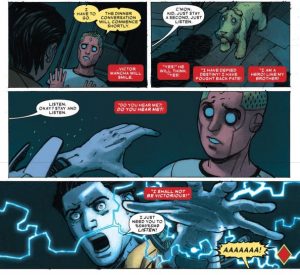
Rather than quitting while he is well ahead, King then throws another log onto the fire, and delivers us a new premonition at the very moment Vin’s life is cut short: “At the end of this story, Victor Mancha will be all that stands between Vision and the destruction of the world. On that day he will die.” The implication is clear; the inevitability is overwhelming; and yet by the same token, there is an almost mocking quality to the way King flaunts something unsaid, lurking just behind the curtain. Our only option is to push forwards.
And so we have. The Vision #11, aptly subtitled “You and I Were Born For Better Things,” brings us the precipice of our confrontation. After a brief conversation between Virginia and Viv about the threat to their existence posed by Vision’s hunt for his brother, we are greeted with a characteristically gorgeous two-page splash by what I will hereafter refer to as “Undisputed Art Team of the Decade,” Gabriel Hernandez Walta and Jordie Bellaire. In a callback to the younger Visions’ descent-from-above towards the upturned eyes of their decidedly inferior schoolmates, Papa Vision now hovers above a crowd of startlingly humanized heroes. Walta’s simple linework lends an appropriately childlike quality to the group, while Bellaire’s muted colors remove any traditionally heroic shine from the ensemble.
Above the defending party hangs a billboard featuring a larger-then-life rendition of square-jawed wonder-twin (pun dramatically intended), Simon Williams AKA Wonder Man AKA Source of Vision’s Brain Patterns And Therefore In Massive Violation Of The Bro Code Based On His Relationship With V’s Ex-Wife. Walta’s careful placement establishes the Vision’s human counterpart as the only figure in frame (extra two-dimensional though he may be) to reside just slightly above eye level to his “brother”, a constant reminder of the humanity that is always just out of reach for our synthezoid protagonist.
Because that is, at the core, what every Vision story is about: a constant, eternally unsatisfied reaching for humanity. King understands this, and uses his leading man’s incessant need to conform as the engine driving his tragedy towards its climax. Humanity is saving one’s family, no matter the cost, so how Vision not risk his own reputation to cover up his wife’s indiscretions? Humanity is justice, so how can the Vision allow his son’s murderer to continue living?

Across the first half of “You And I Were Born For Better Things”, we are reminded of the earliest hints of Vision’s desire to achieve more than simple sentience, with the help of King’s deliberate deployment of repurposed quotes from the synthezoid’s fifty year old origin in Avengers (v1) #57 and #58. As we witness the current Avengers and Inhumans and their miscellaneous allies all come up short in an attempt to deter Vision’s quest for revenge, our narration retells his earliest moments, his initial conflict with his creator Ultron, and the incessant questioning of purpose that would remain a hallmark of his identity for the following half-a-century. It is a haunting soundtrack, affording an appropriate sense of uneasy quiet to the current and clearly lopsided battle.
And suddenly, there is a turn: A mirrored retelling of origin, this time centered around Virginia’s creation; a nod as if to say, “this has never been just his story,” though we were always inclined to think so. Because who was this woman? Just a compilation of antiquated thought patterns; just a fabricated mind in a mechanical form. Who was she to achieve anything beyond what she was made for?
Only now, coming on the heels of that elegant reminder that our hero’s heroics were not just a given, but a choice that he made in spite of his maker, the curtain is pulled back. As Victor stands between Vision and his wife, her hand phased through his chest, as we witness Virginia’s final sacrifice to solve the unsolvable problem, everything falls into place.
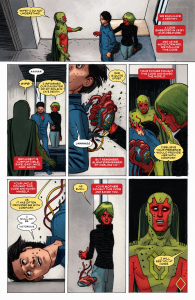
Humanity is not just an endeavor endlessly to save, but is also to be saved. In the moment she pulls the young avengers’ heart from his body, Virginia rescues her husband from an inevitable destiny, and offers him a greater humanity than he has ever known. Moreover, as our noticeably invested narrator (stay tuned to that, it’s going to be important) is careful to point out: she saves Viv. All of the fault, all of the flaws no longer reside in the creator, nor in his family, but in a single one of his creations: Virginia the broken; Virginia the villain; Virginia, the would-be-destroyer of the world. In taking on the burden of Victor’s murder, she has absolved her family of the blame, and freed them to move forward along whatever path they choose.
The weight of this moment is not lost on anyone. Virginia knows she will be stopped now, if not by Vision, then by his fellow Avengers. That’s what makes her final moment so heartbreaking, as she turns away with that simplest of phrases: “I will see you at home.”
It’s almost as if we knew the ending all along.
Verdict: BUY! Buy a copy for yourself. Buy a copy for your kids. Buy a copy for your parents. Buy a copy for your friends. Buy a copy for you pets (mmm…maybe not pets…R.I.P Sparky). King and Walta and Bellaire are doing something with this comic that we will be talking about for many years to come. You should get in on the conversation.

